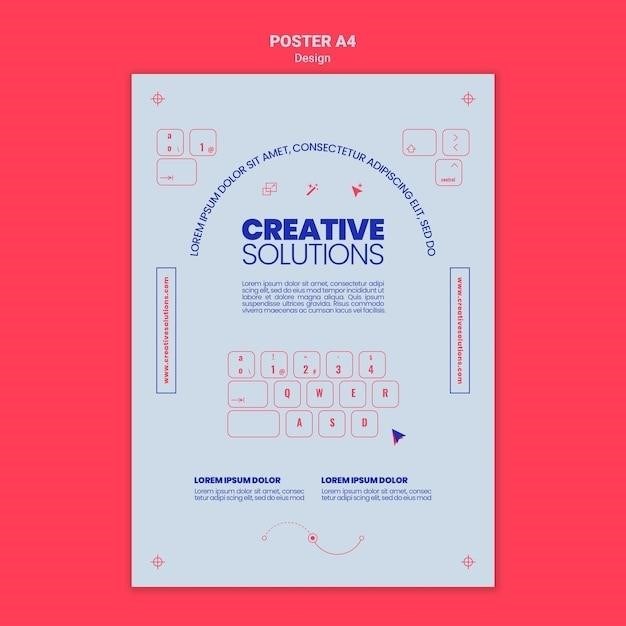The Talent Code PDF⁚ A Comprehensive Guide
This book delves into the fascinating world of talent development‚ revealing that greatness is not innate but a product of focused practice and specific neurological processes. “The Talent Code” by Daniel Coyle explores how talent hotbeds around the globe cultivate extraordinary individuals‚ identifying the key elements that contribute to their success. It’s a must-read for anyone seeking to unlock their potential and achieve peak performance in any field.

Introduction
In today’s society‚ the pursuit of excellence is a constant theme. We strive for greatness in our careers‚ personal lives‚ and even hobbies. Yet‚ the path to achieving exceptional results often feels elusive. Many believe that talent is an inherent gift‚ bestowed upon a select few. However‚ a groundbreaking book‚ “The Talent Code⁚ Greatness Isn’t Born. It’s Grown. Heres How” by Daniel Coyle‚ challenges this notion. Coyle‚ a renowned author and journalist‚ embarks on a journey to unravel the secrets behind talent development‚ drawing upon cutting-edge neuroscience and extensive research conducted in various talent hotbeds worldwide. He argues that while innate abilities play a role‚ true talent is cultivated through a combination of deliberate practice‚ immersive environments‚ and expert guidance. The Talent Code PDF provides a comprehensive exploration of these principles‚ offering readers a roadmap for unlocking their potential and achieving remarkable results in any field.
Overview of The Talent Code
The Talent Code PDF delves into the fascinating world of talent development‚ challenging the conventional notion that talent is solely an innate gift. Coyle’s research explores how individuals in various talent hotbeds‚ ranging from baseball fields in the Caribbean to classical music academies in upstate New York‚ consistently achieve extraordinary levels of skill. Through meticulous observation and interviews with coaches‚ mentors‚ and prodigies‚ Coyle uncovers a common thread⁚ a specific neurological mechanism that drives talent development. This mechanism‚ termed “myelination‚” involves the growth of a fatty substance called myelin around nerve fibers‚ enhancing the speed and efficiency of neural communication. The Talent Code PDF outlines three key elements that contribute to the development of this neurological advantage⁚ deep practice‚ ignition‚ and master coaching. These elements act as catalysts‚ enabling individuals to harness their potential and achieve remarkable results in their chosen fields.
Key Concepts
At the heart of “The Talent Code” lies the concept of “deep practice‚” which goes beyond mere repetition. It involves purposeful‚ focused effort designed to push individuals beyond their comfort zones and challenge their existing skill sets. This process‚ according to Coyle‚ leads to the development of “myelin‚” a fatty substance that insulates nerve fibers‚ accelerating neural communication and enhancing proficiency. Another crucial concept is “ignition‚” the spark that ignites a person’s passion and commitment to their chosen field. It often stems from a revelatory moment‚ a profound experience that instills a deep desire to excel. Master coaching‚ the third key concept‚ involves the guidance of experienced mentors who possess a deep understanding of their craft. Master coaches act as catalysts‚ helping individuals identify their strengths and weaknesses‚ providing constructive feedback‚ and guiding them through challenging practice sessions. Through these interconnected concepts‚ “The Talent Code” underscores the importance of deliberate practice‚ passionate engagement‚ and expert mentorship in unlocking one’s full potential.
The Talent Code⁚ Greatness Isnt Born. Its Grown.
This central tenet of “The Talent Code” challenges the traditional notion of innate talent. Coyle argues that while genetics may play a role‚ it is ultimately through dedicated effort and the right environment that true greatness emerges. He dismantles the myth of “natural talent” and instead highlights the transformative power of deliberate practice and the role of “talent hotbeds” ⸺ environments that foster growth and nurture extraordinary individuals. Drawing on cutting-edge neurology and extensive research‚ the book demonstrates how the brain adapts and rewires itself in response to focused practice. The concept of “myelin‚” a fatty substance that insulates nerve fibers‚ plays a central role in this process. The more an individual practices a skill‚ the more myelin is built‚ enhancing neural communication and leading to faster‚ more efficient execution. This neurobiological foundation forms the basis for Coyle’s argument that greatness is not a preordained gift but a product of deliberate effort and strategic development.
The Three Talent Boosters
Coyle identifies three key elements that fuel the development of exceptional talent⁚ Deep Practice‚ Ignition‚ and Master Coaching. Each of these elements plays a crucial role in facilitating the brain’s ability to build myelin and enhance skill acquisition. Deep Practice involves focused‚ deliberate repetition of a skill‚ pushing the individual beyond their comfort zone and fostering the growth of neural pathways. Ignition refers to the creation of those “aha” moments‚ experiences that spark a passion for the skill and ignite a desire to improve. These moments can be anything from witnessing a master performer to experiencing a breakthrough in personal practice. Finally‚ Master Coaching involves the guidance of a skilled mentor who can provide personalized feedback‚ identify areas for improvement‚ and push the individual towards greater mastery. These three elements work in tandem to create a powerful cycle of learning and growth‚ ultimately shaping individuals into exceptional performers in their chosen fields.
Deep Practice
Deep Practice is the cornerstone of skill development‚ a process that goes beyond mere repetition and delves into the realm of deliberate‚ focused effort. It’s about pushing oneself beyond comfort zones‚ embracing challenges‚ and seeking out feedback to identify areas for improvement. Coyle emphasizes the importance of “myelin‚” a fatty substance that insulates and speeds up the transmission of signals along neural pathways. Deep Practice‚ through its demanding nature‚ triggers the growth of myelin‚ leading to increased efficiency and automaticity in skill execution. The more myelin a pathway develops‚ the faster and smoother the skill becomes‚ ultimately transforming clumsy‚ conscious effort into effortless‚ intuitive mastery. This process‚ though demanding‚ is essential for reaching peak performance in any field‚ whether it’s playing a musical instrument‚ mastering a sport‚ or developing expertise in any skill-based domain.
Ignition
Ignition is the spark that ignites passion and fuels the drive for deep practice. It’s the moment when an individual experiences a profound connection with a skill‚ a “revelatory moment” that awakens a deep-seated desire to master it. This spark can be ignited by a captivating performance‚ a personal encounter with a skilled mentor‚ or even a simple‚ unexpected breakthrough in practice. The key is that it creates a powerful emotional connection‚ transforming a mere interest into a burning desire to dedicate time‚ energy‚ and effort to achieving mastery. Ignition is not about talent alone; it’s about the emotional investment that fuels the long and arduous journey of deep practice. Without this emotional spark‚ even the most talented individuals may struggle to maintain the motivation and focus necessary to achieve their full potential.
Master Coaching
Master coaching is the art of guiding individuals through the process of deep practice‚ providing the right feedback‚ encouragement‚ and support at the right time. It’s about understanding the individual’s unique strengths and weaknesses‚ tailoring the coaching approach to their specific needs‚ and fostering a learning environment that encourages exploration‚ experimentation‚ and risk-taking. Master coaches act as mentors‚ providing not only technical guidance but also emotional support‚ fostering a sense of trust and confidence that empowers individuals to push their boundaries and embrace challenges. They create a “matrix‚” a framework that helps individuals understand their strengths and weaknesses‚ identifying areas where they need to focus their practice. This personalized approach ensures that individuals are not just practicing‚ but practicing effectively‚ making the most of every training session and maximizing their potential for growth.

Talent Hotbeds
Coyle’s research takes him to various “talent hotbeds” around the world‚ places renowned for producing exceptional individuals in specific fields. These hotbeds‚ ranging from baseball academies in the Caribbean to classical music schools in upstate New York‚ share common characteristics that foster talent development. They are characterized by a culture of deep practice‚ a focus on creating revelatory moments that ignite passion and motivation‚ and the presence of master coaches who guide individuals through the process of skill acquisition. These hotbeds are not simply places where talented individuals emerge; they are environments that actively cultivate talent‚ creating a fertile ground where individuals can flourish and reach their full potential. The book analyzes the specific practices and cultural elements that contribute to the success of these hotbeds‚ providing valuable insights into how talent can be nurtured and developed in any environment.
Applications of The Talent Code
The principles outlined in “The Talent Code” are not limited to a specific field or discipline. They can be applied across various areas of life‚ from sports and music to education and business. The book emphasizes the importance of deep practice‚ ignition‚ and master coaching in any pursuit where skill development is desired. For example‚ in sports‚ coaches can utilize the principles of deep practice to design training programs that promote skill acquisition and mastery. In music‚ teachers can create environments that foster motivation and ignite passion in their students. In education‚ educators can adopt the principles of master coaching to guide students towards deeper understanding and critical thinking. The book provides a framework for understanding how to optimize talent development in any context‚ offering practical strategies for individuals and organizations seeking to achieve peak performance.
Sports
The realm of sports provides fertile ground for applying the principles of “The Talent Code.” Coyle’s research highlights how elite athletes in various sports‚ like baseball‚ basketball‚ and soccer‚ have achieved mastery through a combination of deep practice‚ ignition‚ and master coaching. Deep practice in sports involves structured training that focuses on specific skills‚ pushing athletes beyond their comfort zones to refine their techniques and improve their performance. Ignition is crucial in sparking passion and motivation in young athletes‚ making them believe in their abilities and driving them to strive for excellence. Master coaching involves providing athletes with personalized guidance‚ feedback‚ and support‚ helping them to identify their strengths and weaknesses and develop strategies for improvement. By applying these principles‚ coaches and athletes can unlock the full potential of talent and achieve remarkable results in the competitive world of sports.
Music
The world of music is a vibrant illustration of the principles outlined in “The Talent Code.” Coyle’s exploration reveals how renowned music academies and conservatories have cultivated exceptional musicians through a structured approach to talent development. Deep practice in music involves meticulous repetition and focused training‚ allowing students to master complex techniques‚ refine their musicality‚ and develop their individual artistry. Ignition plays a vital role in inspiring aspiring musicians‚ igniting their passion for music and encouraging them to push their boundaries. Master coaching in music involves providing students with personalized guidance and feedback‚ shaping their musical development and helping them to achieve their full potential. From classical to jazz‚ from rock to folk‚ the principles of “The Talent Code” offer a blueprint for nurturing musical talent‚ helping individuals to unlock their creative potential and make their mark in the world of music.
Education
The principles of “The Talent Code” have significant implications for the field of education. Coyle’s research suggests that traditional teaching methods that focus solely on rote learning and memorization may not be the most effective way to foster true understanding and develop critical thinking skills. Instead‚ “The Talent Code” advocates for a more holistic approach that emphasizes deep practice‚ ignition‚ and master coaching. Deep practice in education involves engaging students in challenging tasks that require them to apply their knowledge and develop their skills in a meaningful way. Ignition involves creating a stimulating and inspiring learning environment that sparks students’ curiosity and motivates them to excel. Master coaching in education involves providing students with individualized support and guidance‚ helping them to overcome challenges and achieve their academic goals. By implementing these principles‚ educators can create a more effective and engaging learning experience that empowers students to reach their full potential.
The Talent Code⁚ A Practical Guide
Beyond its theoretical framework‚ “The Talent Code” offers practical strategies for cultivating talent in various domains. Coyle provides actionable insights for individuals‚ educators‚ coaches‚ and organizations seeking to optimize performance. The book emphasizes the importance of creating a supportive environment that fosters deep practice‚ ignition‚ and master coaching. It encourages individuals to embrace a growth mindset‚ persevere through challenges‚ and seek out opportunities for meaningful feedback. “The Talent Code” also provides guidance on designing effective practice sessions‚ identifying talent hotbeds‚ and leveraging the power of mentorship. By applying these practical principles‚ readers can cultivate their own talents‚ nurture the talents of others‚ and create environments that foster excellence.
“The Talent Code” stands as a compelling testament to the power of deliberate practice and the neurological mechanisms that underpin skill development. Coyle’s research challenges conventional notions of talent as a fixed trait‚ emphasizing the importance of environment‚ coaching‚ and focused effort. The book provides a roadmap for cultivating excellence‚ encouraging individuals and organizations to embrace a growth mindset‚ invest in deep practice‚ and create supportive environments that foster talent development. By understanding the principles outlined in “The Talent Code‚” readers can unlock their potential‚ nurture the talents of others‚ and contribute to a culture of continuous improvement. The book’s insights are applicable to a wide range of fields‚ from sports and music to education and business‚ offering a valuable framework for achieving peak performance and unlocking human potential.
Further Reading
For those seeking to delve deeper into the world of talent development and explore related concepts‚ several resources offer valuable insights. “The Culture Code” by Daniel Coyle‚ a follow-up to “The Talent Code‚” examines the factors that contribute to the success of highly effective teams and organizations. “The Little Book of Talent” by Coyle provides a concise and accessible overview of the key principles outlined in “The Talent Code‚” making it an ideal starting point for those new to the subject. “Talent Development” by Craig E. Johnson and Donald P. Schwab‚ a comprehensive exploration of talent management practices‚ delves into the strategic approaches organizations can employ to cultivate and retain talent. “Winning the Talent War” by Kerry Larkan offers practical strategies for attracting‚ developing‚ and retaining top talent in a competitive environment. By exploring these works‚ readers can gain a deeper understanding of the complex interplay of talent‚ culture‚ and performance‚ fostering a more informed and effective approach to unlocking human potential.








